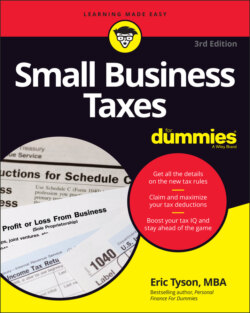Читать книгу Small Business Taxes For Dummies - Eric Tyson - Страница 51
Deciding whether to incorporate
ОглавлениеA corporation, technically speaking, is a legal entity that’s separate from its founders, managers, and employees; it’s owned by shareholders. Your personal assets are protected in case the corporation is sued. C corporations (the subject of this section) provide the most financial protection to shareholders, but many small businesses choose instead to be S corporations because they’re cheaper to start, easier to maintain, and have just one level of taxation compared with the two levels of taxation for C corporations. (I discuss S corporations in more detail later in this chapter.)
Limited liability companies (LLCs) are an increasingly popular option that offer numerous corporate-like benefits (chief among them liability protection) without some of the costs and downsides. Please be sure to read that important discussion later in this chapter.
Before you call a lawyer or your state government offices to figure out how to incorporate, you need to know that incorporating takes time and costs money. Corporations generally involve the highest costs and most administrative hassles among the range of business entities for you to use. There are fees to incorporate, and each state levies an annual fee that you must pay, even if you have no business income that year. You also have higher legal and accounting costs thanks to the more complex tax rules and filings required of corporations, including the dreaded IRS Form 1120, “U.S. Corporation Income Tax Return” (see the first page of the form in Figure 2-1; the complete, most recent form is located at www.irs.gov/pub/irs-pdf/f1120.pdf).
In some instances, the decision to incorporate is complicated, but in most cases, it need not be a difficult choice. Taxes may be important to the decision but aren’t the only consideration. This section presents an overview of the critical issues to consider. I discuss liability considerations, including whether you can obtain liability insurance for your chosen profession, as well as tax and other considerations.
If you weigh the following considerations of incorporating and you’re still on the fence, my advice is to keep it simple: Don’t incorporate. After you incorporate, un-incorporating takes time and money. Start as a sole proprietorship and then take it from there. Wait until the benefits of incorporating for your particular case clearly outweigh the costs and drawbacks of incorporating. Likewise, if the only benefits of incorporating can be better accomplished through some other means (such as purchasing insurance), save your money and time and don’t incorporate.
Courtesy of the Internal Revenue Service
FIGURE 2-1: The corporate tax form — IRS Form 1120 — entails a high degree of difficulty. Shown is page one.
